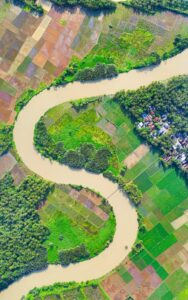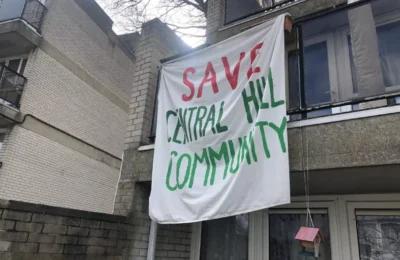From Rupture magazine
Jess Spear
1. Industrialised agriculture is undermining our life support systems.
Wildlife populations are collapsing and many species, unable to scrape a living, are simply going extinct. Deforestation and land clearance destroys ecosystems and replaces them with monoculture crops (eg, wheat, barley, soy) or farmed animals. Big monoculture farms effectively starve wildlife of food and pollute the soil and adjacent lakes, rivers and streams. The continuing expansion of intensive farms means further destruction of ecosystems, more wildlife starvation, and more animals going extinct.
2. And fueling the rise of new pandemics.
Loss of habitat drives wildlife into areas inhabited by humans and increases contact between human populations and wildlife, which then increases the likelihood of zoonotic spillover (that is, infectious diseases jumping from animal to human). In fact, most human diseases originated this way. Big factory farms, with billions of chickens, pigs, and cows reared in often cramped and unsanitary conditions, are also breeding grounds for new pandemics.
3. Climate change will disrupt our food supply.
Millions of people are already suffering from food insecurity because of our rotten, for-profit food system. However, the situation stands to get worse with multiple extreme weather events happening simultaneously – such as a heatwave and drought at the same time, as we saw this summer and last – lead to harvest failures and disrupt supply chains. A decrease in the overall food supply will undoubtedly lead to price spikes and more people suffering deprivation. We are already seeing this and should expect more to occur with increased magnitude and frequency as Earth’s temperature rises. In fact, a study published this summer outlines how current models underestimate the risk of harvest failures in multiple breadbaskets.
4. Top-down changes in agriculture are fueling the rise of the far right.

Not only is the capitalist response to the climate and biodiversity crises inadequate, what little is being done is far too often unplanned and under the control of private industry. Farmers in Europe in particular are greatly impacted by new regulations meant to curb nitrogen fertiliser pollution. But, rather than working with small farmers and assisting them in the necessary transition away from intensive farming, governments have dragged their feet — in Ireland they continue to drag their feet — and now are forcing farmers to rapidly change the way they farm. This haphazard approach opens the door to the far right, who deny climate change and spread conspiracy theories about land theft. We should all take note of what took place in the Netherlands where the farmer-citizen movement, founded only four years ago, won the municipal elections and immediately cancelled the new environmental policies.

5. We must oppose the new enclosures.
Since the economic crash in 2008, international investors have been buying or leasing huge tracts of agricultural land used by subsistence farmers or indigenous peoples. While the global working class, with its tremendous latent power and common interest in overthrowing capitalism, will undoubtedly play a leading role in transforming society, peasants and indigenous peoples are already battling big corporations and states that support them (and winning in some cases). Ecosocialists should support these struggles unconditionally. Additionally, we support the international peasant movement – La Via Campesina – for food sovereignty and for getting rid of the transnational agribusinesses dominating our food system.


